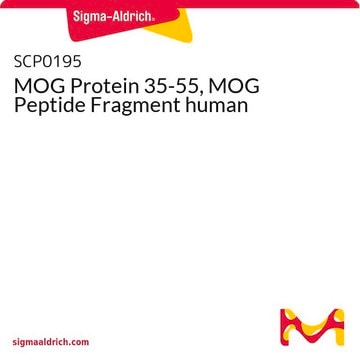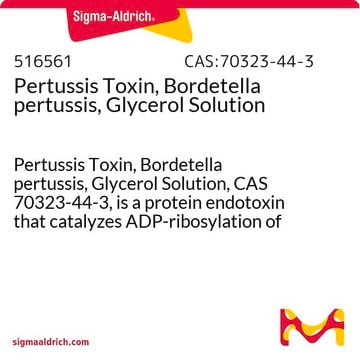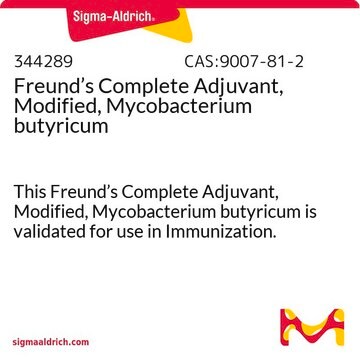M4939
Myelin Oligodendrocyte Glycoprotein Peptide Fragment 35-55 Rat, Mouse
≥97% (HPLC)
Synonym(s):
MOG Peptide 35-55 Rat, Mouse
Sign Into View Organizational & Contract Pricing
All Photos(1)
About This Item
Recommended Products
product name
Myelin Oligodendrocyte Glycoprotein Peptide Fragment 35-55 Rat, Mouse, immunodominant epitope of MOG
Quality Level
Assay
≥97% (HPLC)
form
powder
color
white
application(s)
cell analysis
storage temp.
−20°C
Gene Information
mouse ... Mog(17441)
rat ... Mog(24558)
Amino Acid Sequence
Met-Glu-Val-Gly-Trp-Tyr-Arg-Ser-Pro-Phe-Ser-Arg-Val-Val-His-Leu-Tyr-Arg-Asn-Gly-Lys
General description
Myelin oligodendrocyte glycoprotein (MOG) is a component of the central nervous system and present on the surface of oligodendrocytes and myelin. Its extracellular domain is widely used to generate an autoimmune animal model of multiple sclerosis. In rats, it is expressed in the hippocampus.
Application
- Delayed administration of erythropoietin and its non-erythropoietic derivatives ameliorates chronic murine autoimmune encephalomyelitis.: This paper investigates the delayed therapeutic administration of erythropoietin and its derivatives in the treatment of autoimmune encephalomyelitis, using Myelin Oligodendrocyte Glycoprotein Peptide Fragment 35-55 to induce the disease model in mice (Savino et al., 2006).
- Absence of reuptake of serotonin influences susceptibility to clinical autoimmune disease and neuroantigen-specific interferon-gamma production in mouse EAE.: This research explores the role of serotonin reuptake in modulating immune responses and susceptibility to autoimmune diseases, using Myelin Oligodendrocyte Glycoprotein Peptide Fragment 35-55 to induce experimental autoimmune encephalomyelitis in mice (Hofstetter et al., 2005).
- Transcriptional therapy with the histone deacetylase inhibitor trichostatin A ameliorates experimental autoimmune encephalomyelitis.: The study demonstrates the effectiveness of trichostatin A, a histone deacetylase inhibitor, in treating experimental autoimmune encephalomyelitis. Myelin Oligodendrocyte Glycoprotein Peptide Fragment 35-55 was used to induce the disease model in rats and mice, providing insights into potential epigenetic therapies (Camelo et al., 2005).
Biochem/physiol Actions
Induces experimental autoimmune encephalomyelitis in rodents; a single injection of this peptide produces a relapsing-remitting neurologic disease with extensive plaque-like demyelination; immunization with MOG (35-55) suppresses spontaneous regeneration of dopaminergic neurons injured with MPTP.
Other Notes
Lyophilized from 0.1% TFA in H2O
Storage Class Code
11 - Combustible Solids
WGK
WGK 3
Flash Point(F)
Not applicable
Flash Point(C)
Not applicable
Personal Protective Equipment
dust mask type N95 (US), Eyeshields, Gloves
Certificates of Analysis (COA)
Search for Certificates of Analysis (COA) by entering the products Lot/Batch Number. Lot and Batch Numbers can be found on a product’s label following the words ‘Lot’ or ‘Batch’.
Already Own This Product?
Find documentation for the products that you have recently purchased in the Document Library.
Customers Also Viewed
Novel pathogenic epitopes of myelin oligodendrocyte glycoprotein induce experimental autoimmune encephalomyelitis in C57BL/6 mice
Cecile Delarasse
Immunology, 140(4), 456-464 (2013)
Oligodendrocyte myelin glycoprotein (OMgp) in rat hippocampus is depleted by chronic ethanol consumption.
Okamoto H
Neuroscience Letters, 406(1-2), 76-80 (2006)
Ewa Balkowiec-Iskra et al.
Acta neurobiologiae experimentalis, 63(2), 109-115 (2003-08-21)
The pathological process of neurodegeneration is accompanied by an inflammatory reaction that is believed to contribute to the pathogenesis of neurodegenerative diseases. The aim of our study was to evaluate the influence of autoimmune reaction induced by post-traumatic vaccination with
HIV-1 Tat protein attenuates the clinical course of experimental autoimmune encephalomyelitis (EAE).
Sajad Karampoor et al.
International immunopharmacology, 78, 105943-105943 (2019-12-13)
A growing body of evidence has shown that the human immunodeficiency virus (HIV) infection is associated with a significantly decreased risk of developing multiple sclerosis (MS) in patients with acquired immunodeficiency virus (AIDS). It is thought that two mechanisms are
Rong Chen et al.
Frontiers in molecular neuroscience, 13, 114-114 (2020-07-23)
Multiple sclerosis (MS) is an inflammatory autoimmune disease affecting the central nervous system (CNS) that currently does not have any effective treatment. Experimental autoimmune encephalomyelitis (EAE) is often employed as a model to mimic the clinical manifestations of MS, mainly
Our team of scientists has experience in all areas of research including Life Science, Material Science, Chemical Synthesis, Chromatography, Analytical and many others.
Contact Technical Service









